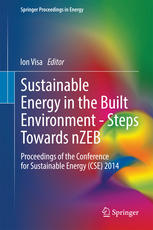

Most ebook files are in PDF format, so you can easily read them using various software such as Foxit Reader or directly on the Google Chrome browser.
Some ebook files are released by publishers in other formats such as .awz, .mobi, .epub, .fb2, etc. You may need to install specific software to read these formats on mobile/PC, such as Calibre.
Please read the tutorial at this link: https://ebookbell.com/faq
We offer FREE conversion to the popular formats you request; however, this may take some time. Therefore, right after payment, please email us, and we will try to provide the service as quickly as possible.
For some exceptional file formats or broken links (if any), please refrain from opening any disputes. Instead, email us first, and we will try to assist within a maximum of 6 hours.
EbookBell Team

0.0
0 reviewsThis book addresses the main challenges faced today in implementing the Nearly Zero Energy Buildings (nZEB) concept. The book starts with a chapter that addresses problems related to the energy demand and renewable energy sources available in the built environment, along with the restrictions and opportunities in developing sustainable, efficient and affordable solutions, also gaining aesthetic and architectural acceptance. Advanced solutions to cover the energy needs by using various renewable-based energy mixes are presented in two chapters. These two chapters discuss the problem of conversion efficiency at the level of components and systems, aiming at giving value to the variable renewable energy sources, in producing thermal and electric energy. The concept is discussed further in a chapter on advanced solutions for water re-use and recycling wastes as second raw materials. The need for new strategies and implementation tools, for education and training is addressed in the final chapter as part of the nZEB concept, towards sustainable communities.
The sub-chapters of the book were openly presented during the 4th Edition of the Conference for Sustainable Energy, held 6-8 November, 2014 and organized by the R&D Centre Renewable Energy Systems and Recycling at the Transilvania University of Brasov, Romania. This event was developed under the patronage of the International Federation for the Promotion of Mechanism and Machine Science (IFToMM), through the Technical Committee Sustainable Energy Systems.